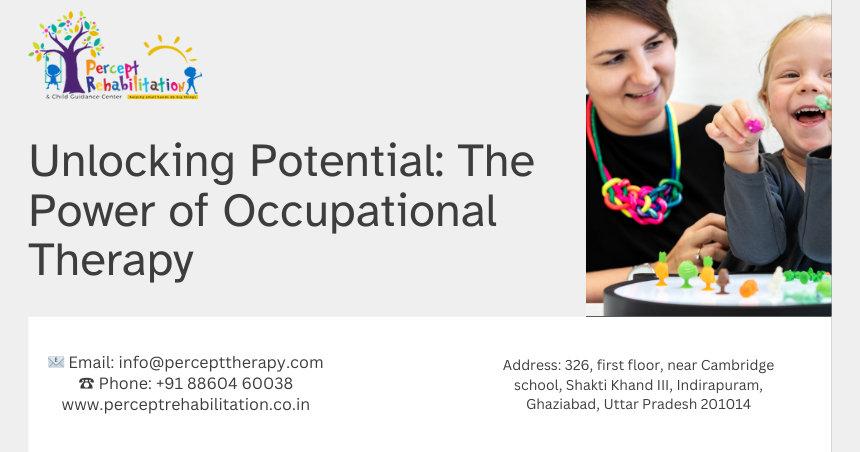Parents often want the best for their children—strong academics, good manners, physical fitness, emotional resilience, and social adaptability. These expectations are natural, yet they often take a wrong turn when comparison steps in. In families seeking occupational therapy in Indirapuram, professionals consistently observe how parental comparisons can hinder rather than help developmental progress.
When comparison becomes a yardstick, children begin to feel less like themselves and more like a mold they’re expected to fit. This not only interferes with their natural growth but also fuels anxiety, resentment, and diminished self-esteem.
The Deep Psychological Impact of Comparison
Every child has a unique developmental timeline shaped by genetics, environment, personality, and individual experiences. Comparing a child who is quiet and observant with one who is outgoing and talkative fails to acknowledge their intrinsic differences.
Children internalize comparisons quickly. When praised relative to a sibling or classmate, the underlying message isn’t always encouragement—it can be competition. This fosters self-doubt, makes them hyperaware of their perceived flaws, and distances them from authentic self-expression.
Parents might think comparisons motivate growth, but often, they damage the very self-worth that growth depends on.
Impact on Cognitive and Emotional Development
When families seek occupational therapy in Indirapuram, many therapists notice delays or regressions in children who’ve been under comparison pressure. Emotional turmoil rooted in not being “good enough” can obstruct language acquisition, focus, executive functioning, or motor coordination.
Children under constant comparison often show:
- Difficulty concentrating
- Increased anxiety or avoidance behavior
- Low frustration tolerance
- Poor body awareness or posture control
- Regression in learned skills
Rather than encouraging improvement, such stress reinforces fear of failure. Instead of exploring new things with curiosity, they begin avoiding them altogether.
Individual Pace Is Not a Flaw
Development doesn’t run on a linear timeline. One child might read at four, while another might not until seven. Neither is better—they’re simply different. This principle stands even stronger for those receiving occupational therapy in Indirapuram, where therapists often emphasize the importance of pacing interventions around the child’s comfort, not parental expectation.
Comparing a child to peers only emphasizes what hasn’t been achieved, rather than what has. It overlooks small victories: putting on shoes independently, asking for help, or expressing emotion clearly.
When these moments are ignored in favor of bigger benchmarks someone else achieved, a child feels invisible.
What Comparison Teaches Your Child?
Here’s what children often absorb when adults consistently compare them:
“I’m not enough.”
They begin to think their efforts or traits don’t measure up.
“Others are better than I.”
They see peers as opponents, not collaborators.
“Love is conditional.”
Approval seems linked to achievement, not presence.
“Mistakes mean I’m a failure.”
They fear errors instead of learning from them.
“My worth depends on others’ standards.”
Self-esteem becomes externally driven.
This subtle programming wires children to seek validation rather than growth.
How Comparisons Can Affect Sibling Dynamics?
Even within families, comparisons cause fractures. Statements like “Why can’t you be more like your sister?” or “Your brother never gives us trouble” breed resentment and create emotional distance.
The child being praised may feel undue pressure to always perform. The one being criticized may grow bitter or act out to reclaim attention. Both suffer from skewed roles that can linger into adulthood.
Focusing on each child’s strengths rather than setting them against each other nurtures mutual respect and individuality.
What Therapists Observe in Children Under Comparison Pressure?
In centers offering occupational therapy in Indirapuram, therapists often notice a specific behavioral pattern in children who are frequently compared:
- Reluctance to attempt new tasks
- Perfectionistic tendencies
- Avoidant social behavior
- Lack of playfulness in therapy
- Emotional shutdown or meltdowns
These aren’t just “phases.” They’re manifestations of deep-rooted insecurity, usually reinforced unknowingly at home.
Constructive Alternatives to Comparison
Parents don’t need to compare to encourage progress. Here’s what they can do instead:
Focus on Progress, Not Perfection
Celebrate the effort, not just the outcome. Whether your child learned to zip a jacket or made eye contact during a conversation, these are big wins.
Recognize Individual Strengths
Every child excels in something—art, movement, empathy, storytelling. Acknowledge these openly.
Promote Self-Reflection
Encourage your child to set personal goals and reflect on their journey rather than others’.
Use Positive Language
Replace “Why can’t you do it like…” with “Let’s try it your way.” It encourages creativity and builds confidence.
Validate Their Feelings
When they fall behind or feel insecure, let them know it’s okay to feel that way and reassure them of your support.
Some Real-Life Practices to Break the Habit of Comparison
Here are actionable habits that help foster growth without comparison:
- Keep a daily or weekly journal, noting your child’s progress, no matter how small.
- Instead of asking about grades, ask what they enjoyed learning.
- Praise character, not just achievements. Say, “I saw how kind you were,” instead of “Great marks again.”
- Create one-on-one time with each child, allowing space to be themselves without external benchmarks.
- Remove labels—“the smart one,” “the shy one,” “the athletic one”—they box children into roles.
Rebuilding Trust with a Child Affected by Comparison
If a child has been subject to frequent comparisons, trust and connection might need repair. Begin by acknowledging your role honestly. Children respect vulnerability. You might say, “I know I sometimes said things that made you feel like I wanted you to be someone else. That wasn’t fair.”
This opens a channel for healing. Then, focus on consistent affirmation of their efforts, interests, and unique identity.
Professionals offering occupational therapy in Indirapuram often advise incorporating therapeutic play to rebuild self-worth. Encouraging expression through drawing, storytelling, or movement can support emotional recovery.
Why Your Child’s Journey Is Worth Honoring?
Each child’s path is woven with triumphs and setbacks. Comparing it with another’s reduces a rich, multidimensional experience into a single benchmark. When we stop comparing, we finally see the beauty in who they already are, not who we wish they’d be.
Your child is not a reflection of someone else’s timeline. They are a universe of their own—unfolding quietly, at their rhythm.
10 Powerful Reasons to Avoid Comparing Children
- Kills Self-Confidence – Makes them doubt their abilities.
- Destroys Motivation – Pressure leads to resistance.
- Harms Emotional Health – Increases stress and anxiety.
- Creates Sibling Rivalry – Leads to long-term tension.
- Blocks Authentic Growth – Focus shifts to copying others.
- Encourages Fear of Failure – Stops risk-taking behavior.
- Undermines Uniqueness – Devalues natural strengths.
- Fuels Perfectionism – Traps them in never-ending pressure.
- Disrupts Parent-Child Bond – Erodes trust and communication.
- Worsens Learning Outcomes – Comparison is a poor teaching tool.
The Role of Therapists in Supporting Individual Growth
For children receiving occupational therapy in Indirapuram, therapy sessions are designed to meet them where they are, not where someone else was at their age. The goal is not to “catch up” with others, but to grow in ways that match their needs.
Therapists become allies who model acceptance. They create environments that encourage autonomy, offer choices, and acknowledge the child’s internal compass. When parents also follow this path, it fosters resilience that lasts a lifetime.
Parenting Without Comparison: A Daily Commitment
Rejecting comparison isn’t a one-time decision—it’s a conscious practice. It means reframing thoughts, checking language, and learning to sit with discomfort when your child struggles.
But this discomfort has a purpose. It signals that you’re giving your child space to grow authentically. And in that space, they will discover confidence not built on competition but on compassion, for themselves and others.
You don’t have to raise the best child. You have to raise your child with patience, empathy, and belief in their journey.


